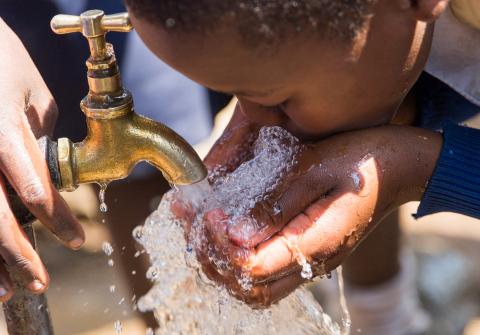
Clean Water Essential to Curbing Spread of Disease in East Africa
East African Community Headquarters, Arusha, 23rd March 2022: On World Water Day, marked on the 22nd of March the United Nations recognizes the critical and multidimensional role that water plays for individuals, households, communities, governments and businesses globally.
Access to safe drinking water – a precious resource often taken for granted – is a human right. However, access to clean, affordable water remains a real challenge for many people in the East and Horn of Africa, with vulnerable groups being disproportionately affected. Beyond using it for drinking, water also plays an enormous role in preserving the health of people across the region.
The region has experienced frequent disease outbreaks in the past, such as cholera, measles, rift valley fever, yellow fever, Crimean-Congo hemorrhagic fever, and COVID-19, among others. Extensive land-borders and intense trade and travel facilitate the spread of infectious diseases across countries in the EAC region.
“Good water, sanitation and hygiene (WASH) practices, that are consistently applied, can help to curb the spread of waterborne and other communicable diseases. This is especially important in areas that experience high levels of human mobility, particularly at border crossings and transportation corridors where local communities have a higher risk of infection”, says Hon. Christophe Bazivamo, EAC Deputy Secretary General, Productive and Social Sectors.. Consequently, these critical public health ‘hot spots’ should be targeted with timely health, hygiene promotion and access to safe water interventions.
The International Organization for Migration (IOM) aims to ensure universal and equitable access to safe and affordable water for those in need, complementing safe water provision with information about appropriate sanitation practices and the systematic promotion of good hygiene.
Together with the EAC Secretariat, IOM is currently implementing a regional health project targeting more than 6 million migrants, border and host communities at 19 key points of entry (PoEs) and migration routes in the six EAC Partner States: Burundi, Kenya, Rwanda, South Sudan, Tanzania and Uganda. This intervention is facilitated through the ‘Support to Pandemic Preparedness in the EAC Region (PanPrep)’ project which is implemented through the Deutsche Gesellschaft für Internationale Zusammenarbeit (GIZ) GmbH on behalf of the German government.
The EAC-IOM project aims to strengthen the capacity of governments in the region to prevent and address the spread of COVID-19 and other infectious diseases of public health concern in the EAC region. The project is also establishing handwashing stations and providing access to water in up to three selected high-risk areas in each of the 6 Partner States.
Through the intervention, which runs from June 2021 to May 2022, IOM is connecting handwashing facilities with sustainable, clean and running water through context-adapted interventions, for example by building water systems in South Sudan and Uganda, and connecting them to existing national water systems that are usually located far from the PoEs, and by constructing a rainwater harvesting system in Rwanda.
To date, more than 4.7 million people have been reached by behavior change interventions, including health and hygiene risk awareness activities and capacity building of key community influencers. Additionally, 31 fixed handwashing facilities, 3 water yards, 5 toilet/latrine blocks and 4 pipeline connections to a water source have been constructed across the 6 countries to improve access to clean water and hygiene services in high-volume migration areas.
“We are happy with the progress of this project, and we hope that the handwashing water facilities and related structures will be handed over to respective Partner State governments very soon,” says Hon. Bazivamo.
He said the Treaty for the Establishment of the EAC provides for joint action towards the prevention and control of epidemics of communicable and vector-borne diseases, as well as pandemics, that might endanger the health and welfare of the residents of the Partner States.
Despite the EAC- intervention, the need remains to scale up the preparedness and response capacity of the Partner States, ensuring access to clean and running water for the entire population, as well as hygiene services, knowledge and behavioral change interventions.
IOM’s Water, Sanitation and Hygiene (WASH) initiatives throughout the East and Horn of Africa have included the construction and rehabilitation of boreholes and wells, water trucking, surface water treatment systems, hygiene promotion campaigns, and distribution of hygiene kits, among others. IOM is also working with communities and governments across the region to protect water resources.
The Organization is committed to guaranteeing inclusion and fighting inequalities that principally affect women, girls, disabled people, refugees, and internally displaced people – who are more often the poorest and the most marginalized when it comes to their basic human rights to water. They should never be left behind.
For more information, please contact:
Simon Peter Owaka
Senior Public Relations Officer
Corporate Communications and Public Affairs Department
EAC Secretariat
Arusha, Tanzania
Tel: +255 768 552087
Email: sowaka [at] eachq.org
About the East African Community Secretariat:
The East African Community (EAC) is a regional intergovernmental organisation of six Partner States, comprising Burundi, Kenya, Rwanda, South Sudan, Tanzania and Uganda, with its headquarters in Arusha, Tanzania.
The EAC Secretariat is ISO 9001: 2015 Certified
Tags: Panprep
